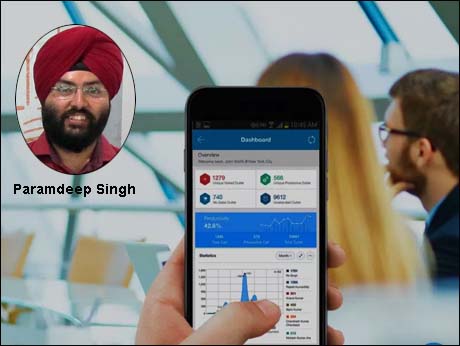
Digitization and sales force automation have re-imagined traditional sales and distribution in the FMCG sector Paramdeep Singh, CEO of Field Assist, a flagship SaaS platform, explains how
January 9 2018: With a high growth of urbanization resulting in a surge in middle class in India, Fast Moving Consumer Goods industry is set to overhaul. Factors such as efficiency & effectiveness in distribution channel –especially the availability & visibility of the brands / products - need to be addressed.
Armed with a deeper understanding of the local market and demography, FMCG companies in India have relied on distributor network. Also, large distributors are equipped to handle the business uncertainties such as lending out to retailers, environment management and demand management. More so, the local distribution structure is fragmented in nature that raises the supply chain costs owing to redundant intermediaries affecting the distribution cycle.
However, with the advent of automation and digitization, the sales and distribution channel in the FMCG sector is undergoing major changes that has redefined the sales process mechanism. The traditional sales and distribution challenges that result in demand supply gaps, increased distribution costs and wastage are now becoming increasingly streamlined via adopting digitization channels and salesforce automation.
And access to data insights, competition information, inventory control and sales processes are now simplified using big data, mobile computing, artificial intelligence, social media, predictive analysis, among others. It helps FMCG marketers and sales workforce to understand customer requirements based on their buying behavior depending on the buying cycle in order to stay ahead of the curve.
Digitization is a huge enabler to ensure repeat buying and brand extensions via intelligently mining the customer information to come up with market insights. That way, FMCG marketers can make informed, qualified decisions by leveraging on data for improving distribution networks and business tasks.
However, one of the key challenges for marketers is to map the end of the supply cycle of the product where it moves from the retailer’s shelf to the consumer’s purchase bag, for which they [marketers] bank on real-time data. This is a point where the right information is needed at a ‘fast pace’ as it is critical in making learned decisions. Further, companies to understand sales trend, availability, visibility and information on competition, is warranted to constantly stay afloat amidst a data pool and add value to the buyer’s buying cycle.
Salesforce automation coupled with cloud computing has now removed the need for physical synching of data. Now data ‘moves’ and while it may a bit disparate for the marketers/ sales veterans, but it serves as a staple framework to nearly align the market dynamism with the sales process.
Automation, quite ironically, is helping marketers to offer a more enhanced, personalized customer experience. Industry experts believe that digitization [especially social media listing, social media strategy and big data] is an important organizational tool to map the buyer’s purchase roadmap in order to ensure repeat buying and building brand advocacy.
That said, the future of the Indian FMCG industry looks optimal. Owing to higher disposable incomes, growing population, awareness and a consumption-driven society, consumers have already gone digital and like gorging on personalized, real-time content to make informed buying decisions. Dominant factors such as online services and mobility is making the FMCG industry digitally-ready to provide information at every customer/ consumer-touch point. And so, retail players must focus on building capacities in digital marketing and advanced technologies to not just grow but also thrive in the business.
Companies – ranging from SMEs to legacy corporations - have started using salesforce automation technology to improve performance of field force and boost productivity. The future of FMCG products effective & efficient distribution, market leadership depends on Salesforce automation and using digitization to reach a certain scale with respect to business growth.
Hence in order to have a sustainable competitive advantage over others, FMCG companies need to be adaptive to emerging technologies, proactive to deal with crisis situations and flexible deploying strategies to stay ahead of the curve in the market. As the lines between traditional distribution sales and new-age digital channels are blurring, an efficient FMCG business will need superior infrastructure support, effective distribution network, automated sales processes and efficient, streamlined supply chain management.
Headquartered in Gurgaon, FieldAssist is a SaaS platform, serving more than 100 brands worldwide helping them increase their brand presence with the use of mobility in past. It was incubated at IIM – Ahmedabad in 2010, by 4 Graduates of IIT-Dhanbad, to simplify the use of mobility for augmenting sales.